Corporate Social Responsibility | Sample Assignment
VerifiedAdded on 2021/01/02
|8
|2422
|253
AI Summary
Contribute Materials
Your contribution can guide someone’s learning journey. Share your
documents today.

STUDY SKILLS
Secure Best Marks with AI Grader
Need help grading? Try our AI Grader for instant feedback on your assignments.
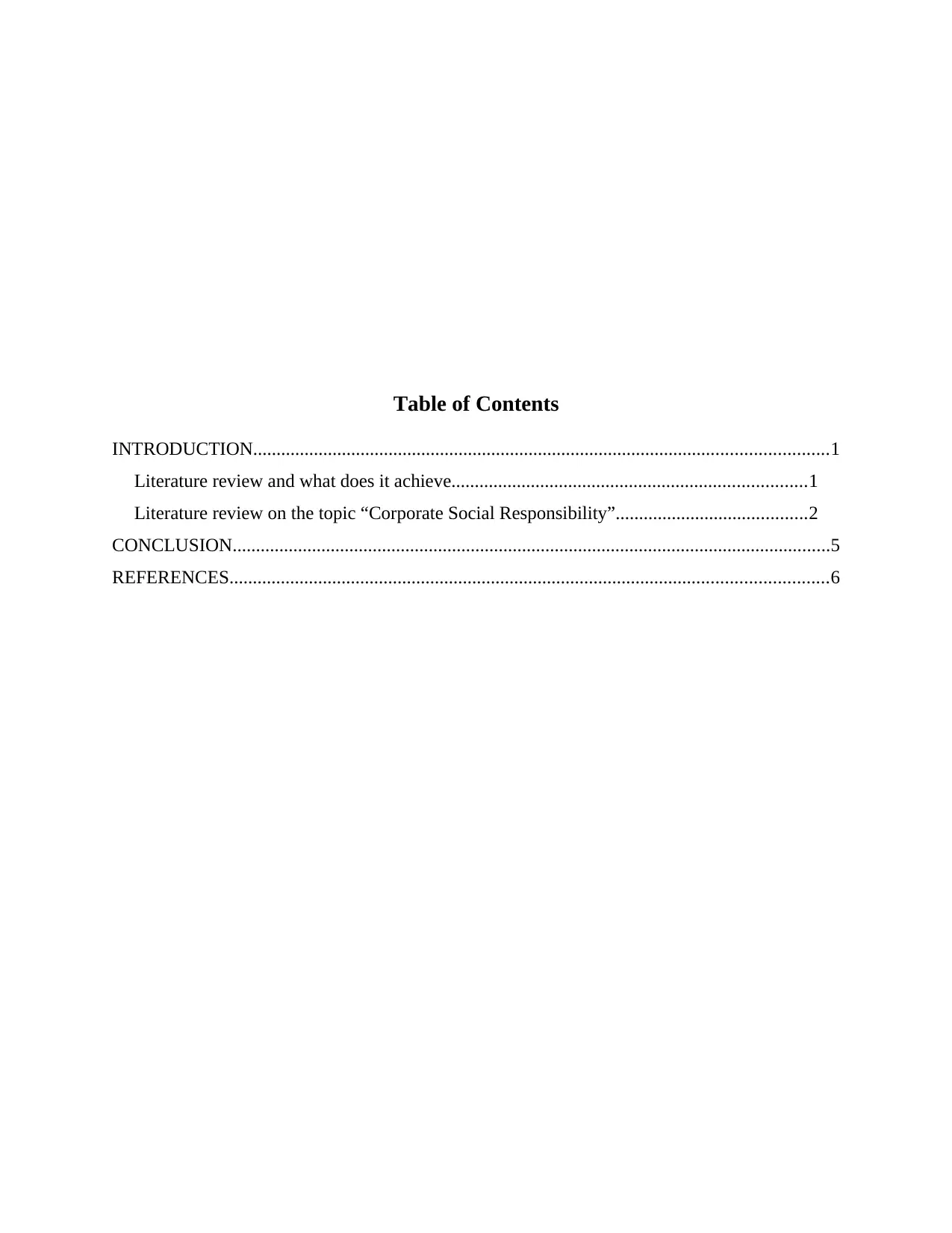
Table of Contents
INTRODUCTION...........................................................................................................................1
Literature review and what does it achieve............................................................................1
Literature review on the topic “Corporate Social Responsibility”.........................................2
CONCLUSION................................................................................................................................5
REFERENCES................................................................................................................................6
INTRODUCTION...........................................................................................................................1
Literature review and what does it achieve............................................................................1
Literature review on the topic “Corporate Social Responsibility”.........................................2
CONCLUSION................................................................................................................................5
REFERENCES................................................................................................................................6
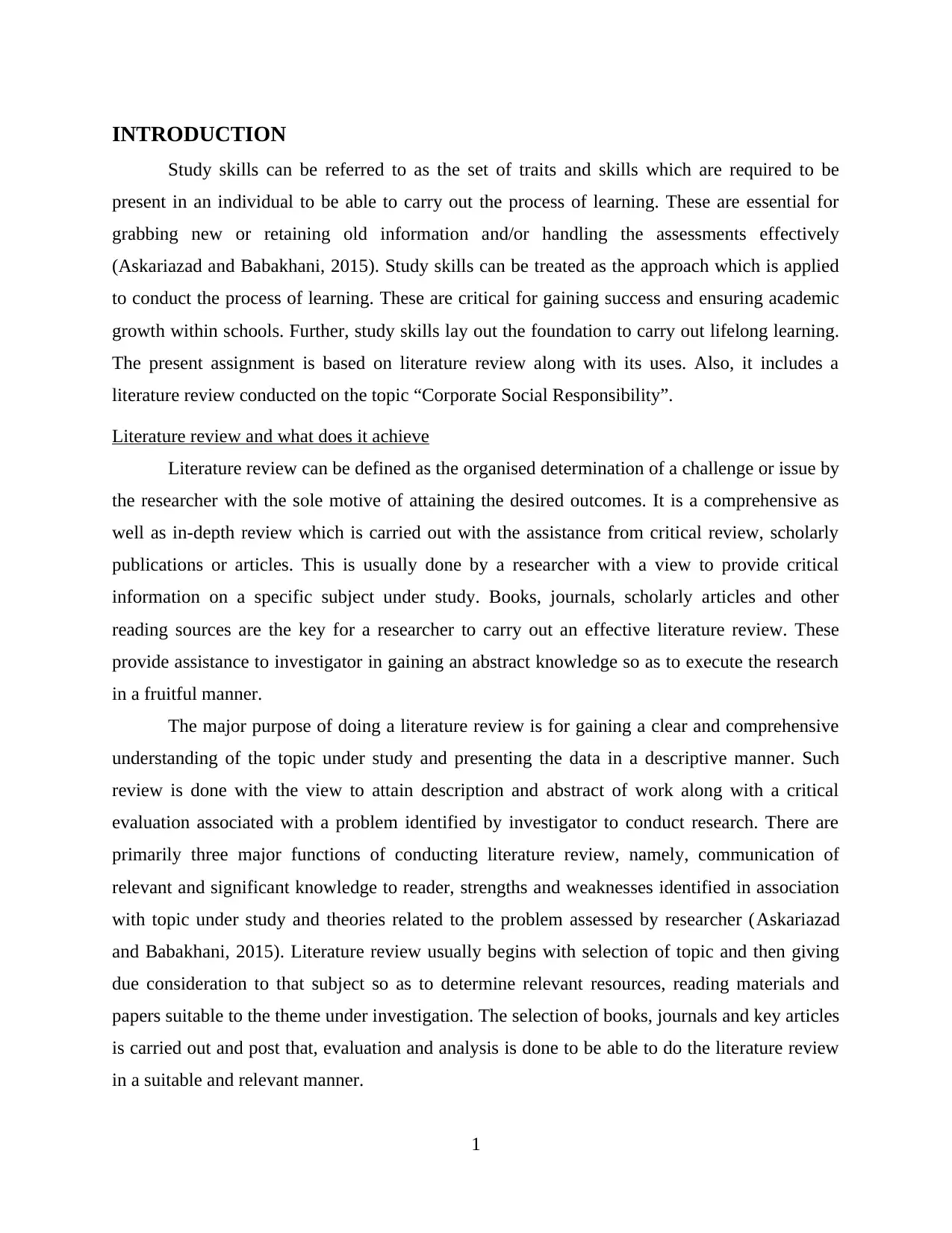
INTRODUCTION
Study skills can be referred to as the set of traits and skills which are required to be
present in an individual to be able to carry out the process of learning. These are essential for
grabbing new or retaining old information and/or handling the assessments effectively
(Askariazad and Babakhani, 2015). Study skills can be treated as the approach which is applied
to conduct the process of learning. These are critical for gaining success and ensuring academic
growth within schools. Further, study skills lay out the foundation to carry out lifelong learning.
The present assignment is based on literature review along with its uses. Also, it includes a
literature review conducted on the topic “Corporate Social Responsibility”.
Literature review and what does it achieve
Literature review can be defined as the organised determination of a challenge or issue by
the researcher with the sole motive of attaining the desired outcomes. It is a comprehensive as
well as in-depth review which is carried out with the assistance from critical review, scholarly
publications or articles. This is usually done by a researcher with a view to provide critical
information on a specific subject under study. Books, journals, scholarly articles and other
reading sources are the key for a researcher to carry out an effective literature review. These
provide assistance to investigator in gaining an abstract knowledge so as to execute the research
in a fruitful manner.
The major purpose of doing a literature review is for gaining a clear and comprehensive
understanding of the topic under study and presenting the data in a descriptive manner. Such
review is done with the view to attain description and abstract of work along with a critical
evaluation associated with a problem identified by investigator to conduct research. There are
primarily three major functions of conducting literature review, namely, communication of
relevant and significant knowledge to reader, strengths and weaknesses identified in association
with topic under study and theories related to the problem assessed by researcher (Askariazad
and Babakhani, 2015). Literature review usually begins with selection of topic and then giving
due consideration to that subject so as to determine relevant resources, reading materials and
papers suitable to the theme under investigation. The selection of books, journals and key articles
is carried out and post that, evaluation and analysis is done to be able to do the literature review
in a suitable and relevant manner.
1
Study skills can be referred to as the set of traits and skills which are required to be
present in an individual to be able to carry out the process of learning. These are essential for
grabbing new or retaining old information and/or handling the assessments effectively
(Askariazad and Babakhani, 2015). Study skills can be treated as the approach which is applied
to conduct the process of learning. These are critical for gaining success and ensuring academic
growth within schools. Further, study skills lay out the foundation to carry out lifelong learning.
The present assignment is based on literature review along with its uses. Also, it includes a
literature review conducted on the topic “Corporate Social Responsibility”.
Literature review and what does it achieve
Literature review can be defined as the organised determination of a challenge or issue by
the researcher with the sole motive of attaining the desired outcomes. It is a comprehensive as
well as in-depth review which is carried out with the assistance from critical review, scholarly
publications or articles. This is usually done by a researcher with a view to provide critical
information on a specific subject under study. Books, journals, scholarly articles and other
reading sources are the key for a researcher to carry out an effective literature review. These
provide assistance to investigator in gaining an abstract knowledge so as to execute the research
in a fruitful manner.
The major purpose of doing a literature review is for gaining a clear and comprehensive
understanding of the topic under study and presenting the data in a descriptive manner. Such
review is done with the view to attain description and abstract of work along with a critical
evaluation associated with a problem identified by investigator to conduct research. There are
primarily three major functions of conducting literature review, namely, communication of
relevant and significant knowledge to reader, strengths and weaknesses identified in association
with topic under study and theories related to the problem assessed by researcher (Askariazad
and Babakhani, 2015). Literature review usually begins with selection of topic and then giving
due consideration to that subject so as to determine relevant resources, reading materials and
papers suitable to the theme under investigation. The selection of books, journals and key articles
is carried out and post that, evaluation and analysis is done to be able to do the literature review
in a suitable and relevant manner.
1
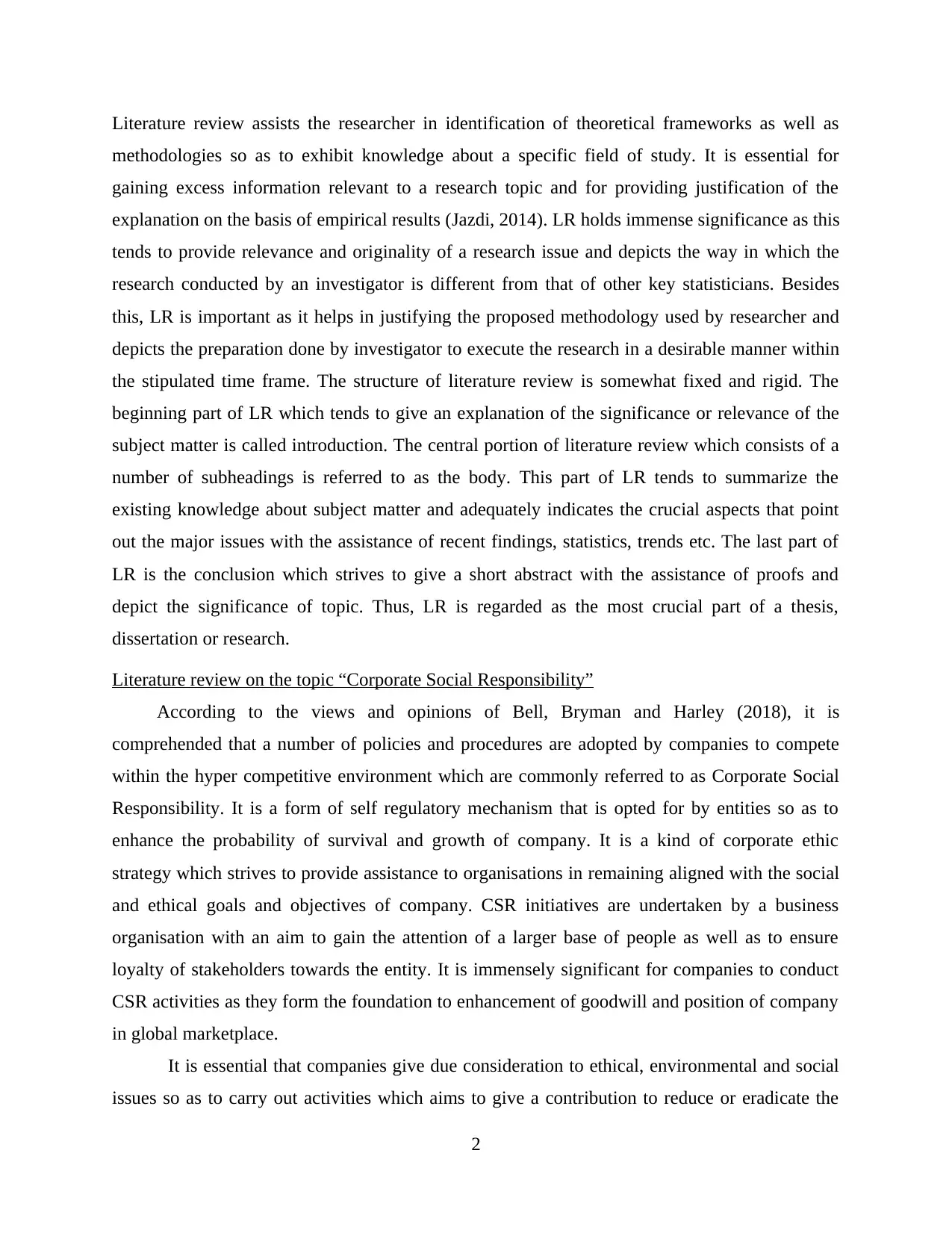
Literature review assists the researcher in identification of theoretical frameworks as well as
methodologies so as to exhibit knowledge about a specific field of study. It is essential for
gaining excess information relevant to a research topic and for providing justification of the
explanation on the basis of empirical results (Jazdi, 2014). LR holds immense significance as this
tends to provide relevance and originality of a research issue and depicts the way in which the
research conducted by an investigator is different from that of other key statisticians. Besides
this, LR is important as it helps in justifying the proposed methodology used by researcher and
depicts the preparation done by investigator to execute the research in a desirable manner within
the stipulated time frame. The structure of literature review is somewhat fixed and rigid. The
beginning part of LR which tends to give an explanation of the significance or relevance of the
subject matter is called introduction. The central portion of literature review which consists of a
number of subheadings is referred to as the body. This part of LR tends to summarize the
existing knowledge about subject matter and adequately indicates the crucial aspects that point
out the major issues with the assistance of recent findings, statistics, trends etc. The last part of
LR is the conclusion which strives to give a short abstract with the assistance of proofs and
depict the significance of topic. Thus, LR is regarded as the most crucial part of a thesis,
dissertation or research.
Literature review on the topic “Corporate Social Responsibility”
According to the views and opinions of Bell, Bryman and Harley (2018), it is
comprehended that a number of policies and procedures are adopted by companies to compete
within the hyper competitive environment which are commonly referred to as Corporate Social
Responsibility. It is a form of self regulatory mechanism that is opted for by entities so as to
enhance the probability of survival and growth of company. It is a kind of corporate ethic
strategy which strives to provide assistance to organisations in remaining aligned with the social
and ethical goals and objectives of company. CSR initiatives are undertaken by a business
organisation with an aim to gain the attention of a larger base of people as well as to ensure
loyalty of stakeholders towards the entity. It is immensely significant for companies to conduct
CSR activities as they form the foundation to enhancement of goodwill and position of company
in global marketplace.
It is essential that companies give due consideration to ethical, environmental and social
issues so as to carry out activities which aims to give a contribution to reduce or eradicate the
2
methodologies so as to exhibit knowledge about a specific field of study. It is essential for
gaining excess information relevant to a research topic and for providing justification of the
explanation on the basis of empirical results (Jazdi, 2014). LR holds immense significance as this
tends to provide relevance and originality of a research issue and depicts the way in which the
research conducted by an investigator is different from that of other key statisticians. Besides
this, LR is important as it helps in justifying the proposed methodology used by researcher and
depicts the preparation done by investigator to execute the research in a desirable manner within
the stipulated time frame. The structure of literature review is somewhat fixed and rigid. The
beginning part of LR which tends to give an explanation of the significance or relevance of the
subject matter is called introduction. The central portion of literature review which consists of a
number of subheadings is referred to as the body. This part of LR tends to summarize the
existing knowledge about subject matter and adequately indicates the crucial aspects that point
out the major issues with the assistance of recent findings, statistics, trends etc. The last part of
LR is the conclusion which strives to give a short abstract with the assistance of proofs and
depict the significance of topic. Thus, LR is regarded as the most crucial part of a thesis,
dissertation or research.
Literature review on the topic “Corporate Social Responsibility”
According to the views and opinions of Bell, Bryman and Harley (2018), it is
comprehended that a number of policies and procedures are adopted by companies to compete
within the hyper competitive environment which are commonly referred to as Corporate Social
Responsibility. It is a form of self regulatory mechanism that is opted for by entities so as to
enhance the probability of survival and growth of company. It is a kind of corporate ethic
strategy which strives to provide assistance to organisations in remaining aligned with the social
and ethical goals and objectives of company. CSR initiatives are undertaken by a business
organisation with an aim to gain the attention of a larger base of people as well as to ensure
loyalty of stakeholders towards the entity. It is immensely significant for companies to conduct
CSR activities as they form the foundation to enhancement of goodwill and position of company
in global marketplace.
It is essential that companies give due consideration to ethical, environmental and social
issues so as to carry out activities which aims to give a contribution to reduce or eradicate the
2
Secure Best Marks with AI Grader
Need help grading? Try our AI Grader for instant feedback on your assignments.
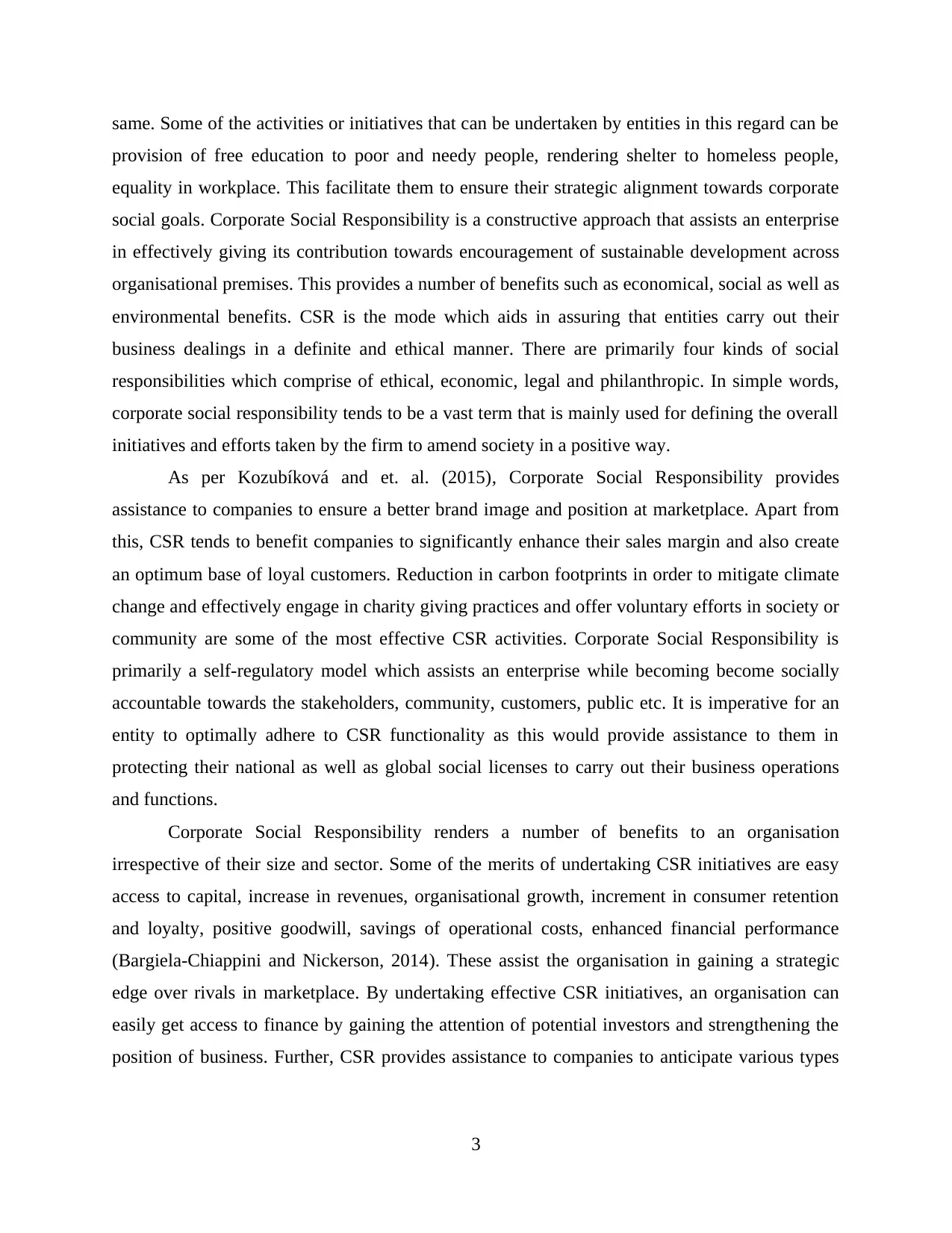
same. Some of the activities or initiatives that can be undertaken by entities in this regard can be
provision of free education to poor and needy people, rendering shelter to homeless people,
equality in workplace. This facilitate them to ensure their strategic alignment towards corporate
social goals. Corporate Social Responsibility is a constructive approach that assists an enterprise
in effectively giving its contribution towards encouragement of sustainable development across
organisational premises. This provides a number of benefits such as economical, social as well as
environmental benefits. CSR is the mode which aids in assuring that entities carry out their
business dealings in a definite and ethical manner. There are primarily four kinds of social
responsibilities which comprise of ethical, economic, legal and philanthropic. In simple words,
corporate social responsibility tends to be a vast term that is mainly used for defining the overall
initiatives and efforts taken by the firm to amend society in a positive way.
As per Kozubíková and et. al. (2015), Corporate Social Responsibility provides
assistance to companies to ensure a better brand image and position at marketplace. Apart from
this, CSR tends to benefit companies to significantly enhance their sales margin and also create
an optimum base of loyal customers. Reduction in carbon footprints in order to mitigate climate
change and effectively engage in charity giving practices and offer voluntary efforts in society or
community are some of the most effective CSR activities. Corporate Social Responsibility is
primarily a self-regulatory model which assists an enterprise while becoming become socially
accountable towards the stakeholders, community, customers, public etc. It is imperative for an
entity to optimally adhere to CSR functionality as this would provide assistance to them in
protecting their national as well as global social licenses to carry out their business operations
and functions.
Corporate Social Responsibility renders a number of benefits to an organisation
irrespective of their size and sector. Some of the merits of undertaking CSR initiatives are easy
access to capital, increase in revenues, organisational growth, increment in consumer retention
and loyalty, positive goodwill, savings of operational costs, enhanced financial performance
(Bargiela-Chiappini and Nickerson, 2014). These assist the organisation in gaining a strategic
edge over rivals in marketplace. By undertaking effective CSR initiatives, an organisation can
easily get access to finance by gaining the attention of potential investors and strengthening the
position of business. Further, CSR provides assistance to companies to anticipate various types
3
provision of free education to poor and needy people, rendering shelter to homeless people,
equality in workplace. This facilitate them to ensure their strategic alignment towards corporate
social goals. Corporate Social Responsibility is a constructive approach that assists an enterprise
in effectively giving its contribution towards encouragement of sustainable development across
organisational premises. This provides a number of benefits such as economical, social as well as
environmental benefits. CSR is the mode which aids in assuring that entities carry out their
business dealings in a definite and ethical manner. There are primarily four kinds of social
responsibilities which comprise of ethical, economic, legal and philanthropic. In simple words,
corporate social responsibility tends to be a vast term that is mainly used for defining the overall
initiatives and efforts taken by the firm to amend society in a positive way.
As per Kozubíková and et. al. (2015), Corporate Social Responsibility provides
assistance to companies to ensure a better brand image and position at marketplace. Apart from
this, CSR tends to benefit companies to significantly enhance their sales margin and also create
an optimum base of loyal customers. Reduction in carbon footprints in order to mitigate climate
change and effectively engage in charity giving practices and offer voluntary efforts in society or
community are some of the most effective CSR activities. Corporate Social Responsibility is
primarily a self-regulatory model which assists an enterprise while becoming become socially
accountable towards the stakeholders, community, customers, public etc. It is imperative for an
entity to optimally adhere to CSR functionality as this would provide assistance to them in
protecting their national as well as global social licenses to carry out their business operations
and functions.
Corporate Social Responsibility renders a number of benefits to an organisation
irrespective of their size and sector. Some of the merits of undertaking CSR initiatives are easy
access to capital, increase in revenues, organisational growth, increment in consumer retention
and loyalty, positive goodwill, savings of operational costs, enhanced financial performance
(Bargiela-Chiappini and Nickerson, 2014). These assist the organisation in gaining a strategic
edge over rivals in marketplace. By undertaking effective CSR initiatives, an organisation can
easily get access to finance by gaining the attention of potential investors and strengthening the
position of business. Further, CSR provides assistance to companies to anticipate various types
3
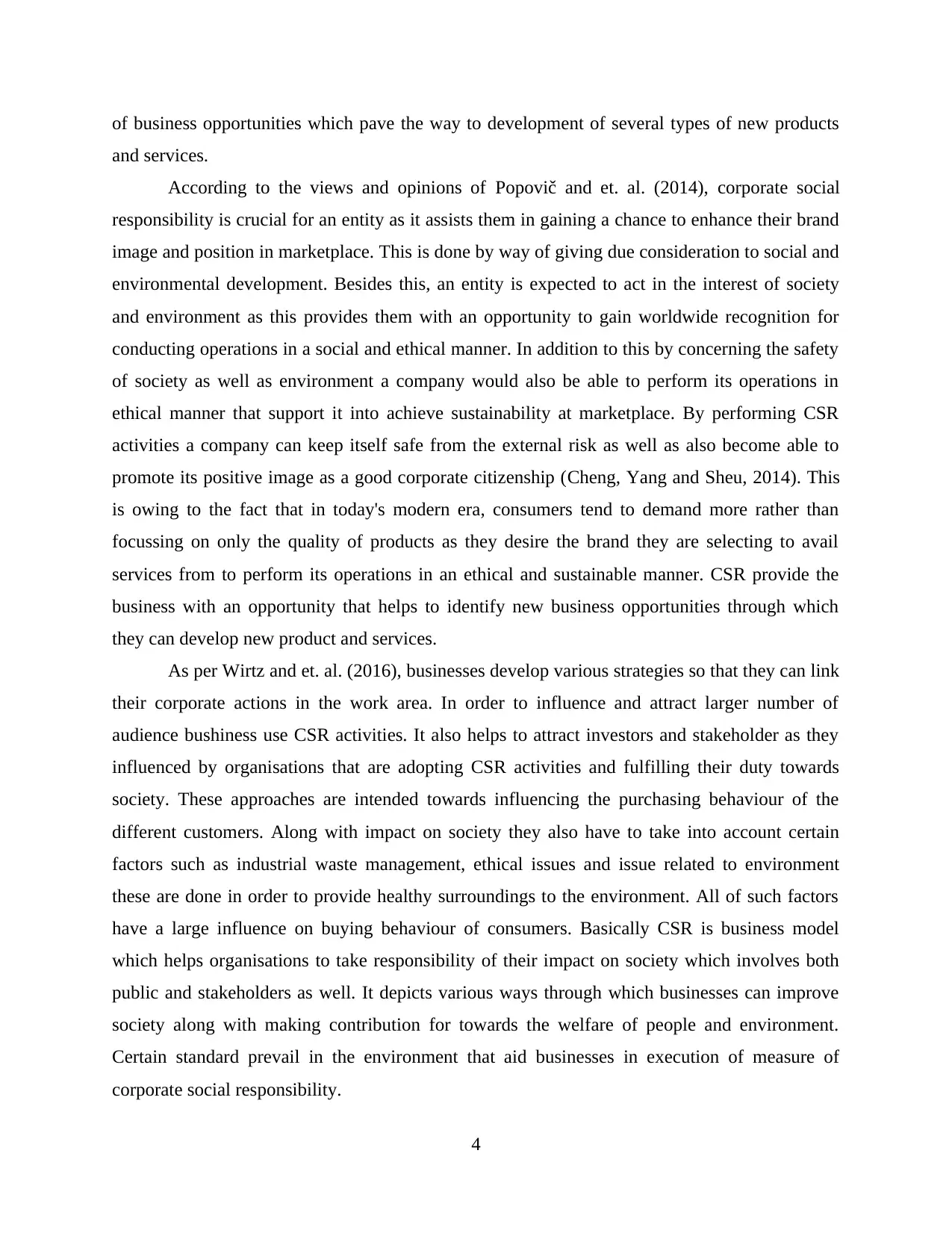
of business opportunities which pave the way to development of several types of new products
and services.
According to the views and opinions of Popovič and et. al. (2014), corporate social
responsibility is crucial for an entity as it assists them in gaining a chance to enhance their brand
image and position in marketplace. This is done by way of giving due consideration to social and
environmental development. Besides this, an entity is expected to act in the interest of society
and environment as this provides them with an opportunity to gain worldwide recognition for
conducting operations in a social and ethical manner. In addition to this by concerning the safety
of society as well as environment a company would also be able to perform its operations in
ethical manner that support it into achieve sustainability at marketplace. By performing CSR
activities a company can keep itself safe from the external risk as well as also become able to
promote its positive image as a good corporate citizenship (Cheng, Yang and Sheu, 2014). This
is owing to the fact that in today's modern era, consumers tend to demand more rather than
focussing on only the quality of products as they desire the brand they are selecting to avail
services from to perform its operations in an ethical and sustainable manner. CSR provide the
business with an opportunity that helps to identify new business opportunities through which
they can develop new product and services.
As per Wirtz and et. al. (2016), businesses develop various strategies so that they can link
their corporate actions in the work area. In order to influence and attract larger number of
audience bushiness use CSR activities. It also helps to attract investors and stakeholder as they
influenced by organisations that are adopting CSR activities and fulfilling their duty towards
society. These approaches are intended towards influencing the purchasing behaviour of the
different customers. Along with impact on society they also have to take into account certain
factors such as industrial waste management, ethical issues and issue related to environment
these are done in order to provide healthy surroundings to the environment. All of such factors
have a large influence on buying behaviour of consumers. Basically CSR is business model
which helps organisations to take responsibility of their impact on society which involves both
public and stakeholders as well. It depicts various ways through which businesses can improve
society along with making contribution for towards the welfare of people and environment.
Certain standard prevail in the environment that aid businesses in execution of measure of
corporate social responsibility.
4
and services.
According to the views and opinions of Popovič and et. al. (2014), corporate social
responsibility is crucial for an entity as it assists them in gaining a chance to enhance their brand
image and position in marketplace. This is done by way of giving due consideration to social and
environmental development. Besides this, an entity is expected to act in the interest of society
and environment as this provides them with an opportunity to gain worldwide recognition for
conducting operations in a social and ethical manner. In addition to this by concerning the safety
of society as well as environment a company would also be able to perform its operations in
ethical manner that support it into achieve sustainability at marketplace. By performing CSR
activities a company can keep itself safe from the external risk as well as also become able to
promote its positive image as a good corporate citizenship (Cheng, Yang and Sheu, 2014). This
is owing to the fact that in today's modern era, consumers tend to demand more rather than
focussing on only the quality of products as they desire the brand they are selecting to avail
services from to perform its operations in an ethical and sustainable manner. CSR provide the
business with an opportunity that helps to identify new business opportunities through which
they can develop new product and services.
As per Wirtz and et. al. (2016), businesses develop various strategies so that they can link
their corporate actions in the work area. In order to influence and attract larger number of
audience bushiness use CSR activities. It also helps to attract investors and stakeholder as they
influenced by organisations that are adopting CSR activities and fulfilling their duty towards
society. These approaches are intended towards influencing the purchasing behaviour of the
different customers. Along with impact on society they also have to take into account certain
factors such as industrial waste management, ethical issues and issue related to environment
these are done in order to provide healthy surroundings to the environment. All of such factors
have a large influence on buying behaviour of consumers. Basically CSR is business model
which helps organisations to take responsibility of their impact on society which involves both
public and stakeholders as well. It depicts various ways through which businesses can improve
society along with making contribution for towards the welfare of people and environment.
Certain standard prevail in the environment that aid businesses in execution of measure of
corporate social responsibility.
4
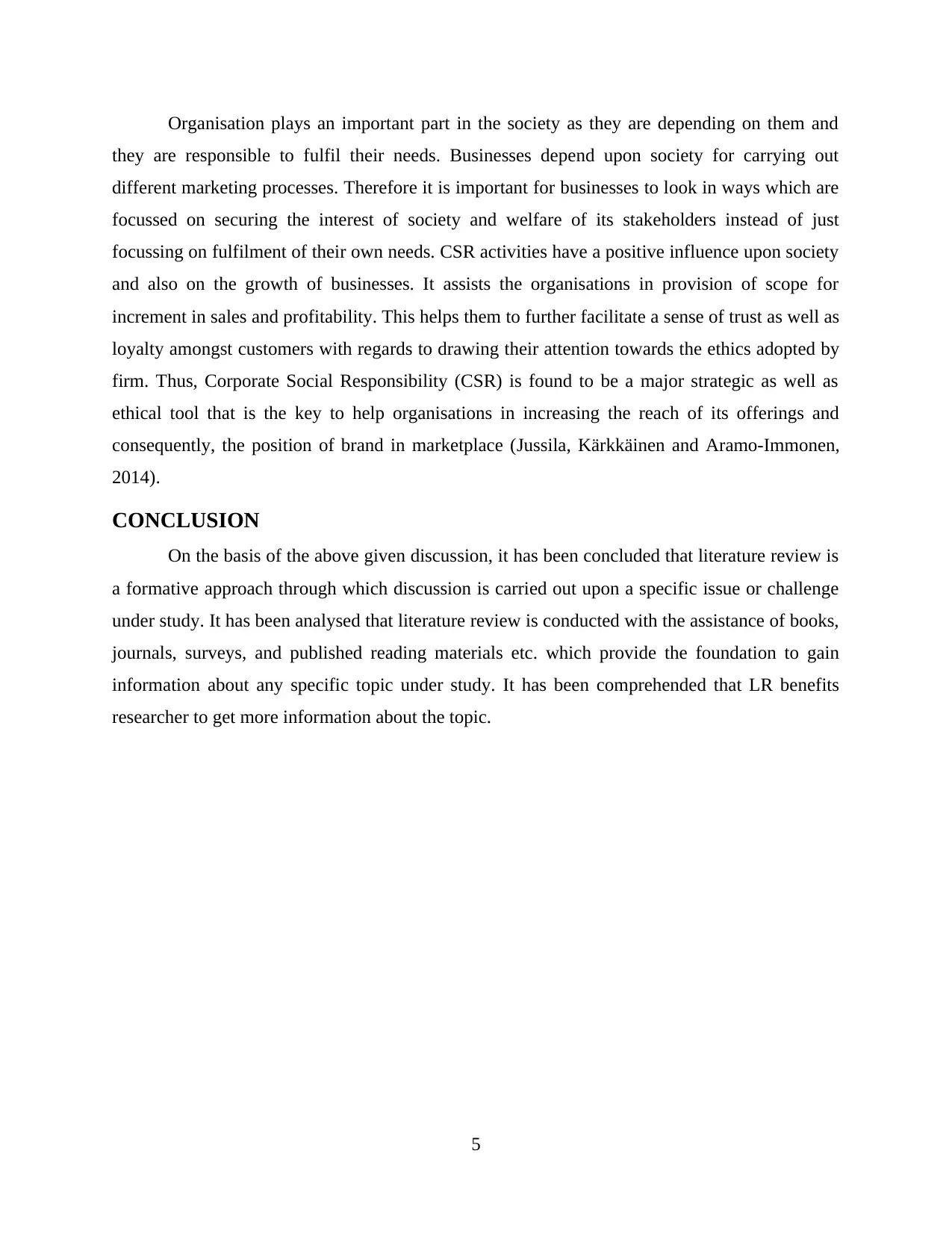
Organisation plays an important part in the society as they are depending on them and
they are responsible to fulfil their needs. Businesses depend upon society for carrying out
different marketing processes. Therefore it is important for businesses to look in ways which are
focussed on securing the interest of society and welfare of its stakeholders instead of just
focussing on fulfilment of their own needs. CSR activities have a positive influence upon society
and also on the growth of businesses. It assists the organisations in provision of scope for
increment in sales and profitability. This helps them to further facilitate a sense of trust as well as
loyalty amongst customers with regards to drawing their attention towards the ethics adopted by
firm. Thus, Corporate Social Responsibility (CSR) is found to be a major strategic as well as
ethical tool that is the key to help organisations in increasing the reach of its offerings and
consequently, the position of brand in marketplace (Jussila, Kärkkäinen and Aramo-Immonen,
2014).
CONCLUSION
On the basis of the above given discussion, it has been concluded that literature review is
a formative approach through which discussion is carried out upon a specific issue or challenge
under study. It has been analysed that literature review is conducted with the assistance of books,
journals, surveys, and published reading materials etc. which provide the foundation to gain
information about any specific topic under study. It has been comprehended that LR benefits
researcher to get more information about the topic.
5
they are responsible to fulfil their needs. Businesses depend upon society for carrying out
different marketing processes. Therefore it is important for businesses to look in ways which are
focussed on securing the interest of society and welfare of its stakeholders instead of just
focussing on fulfilment of their own needs. CSR activities have a positive influence upon society
and also on the growth of businesses. It assists the organisations in provision of scope for
increment in sales and profitability. This helps them to further facilitate a sense of trust as well as
loyalty amongst customers with regards to drawing their attention towards the ethics adopted by
firm. Thus, Corporate Social Responsibility (CSR) is found to be a major strategic as well as
ethical tool that is the key to help organisations in increasing the reach of its offerings and
consequently, the position of brand in marketplace (Jussila, Kärkkäinen and Aramo-Immonen,
2014).
CONCLUSION
On the basis of the above given discussion, it has been concluded that literature review is
a formative approach through which discussion is carried out upon a specific issue or challenge
under study. It has been analysed that literature review is conducted with the assistance of books,
journals, surveys, and published reading materials etc. which provide the foundation to gain
information about any specific topic under study. It has been comprehended that LR benefits
researcher to get more information about the topic.
5
Paraphrase This Document
Need a fresh take? Get an instant paraphrase of this document with our AI Paraphraser
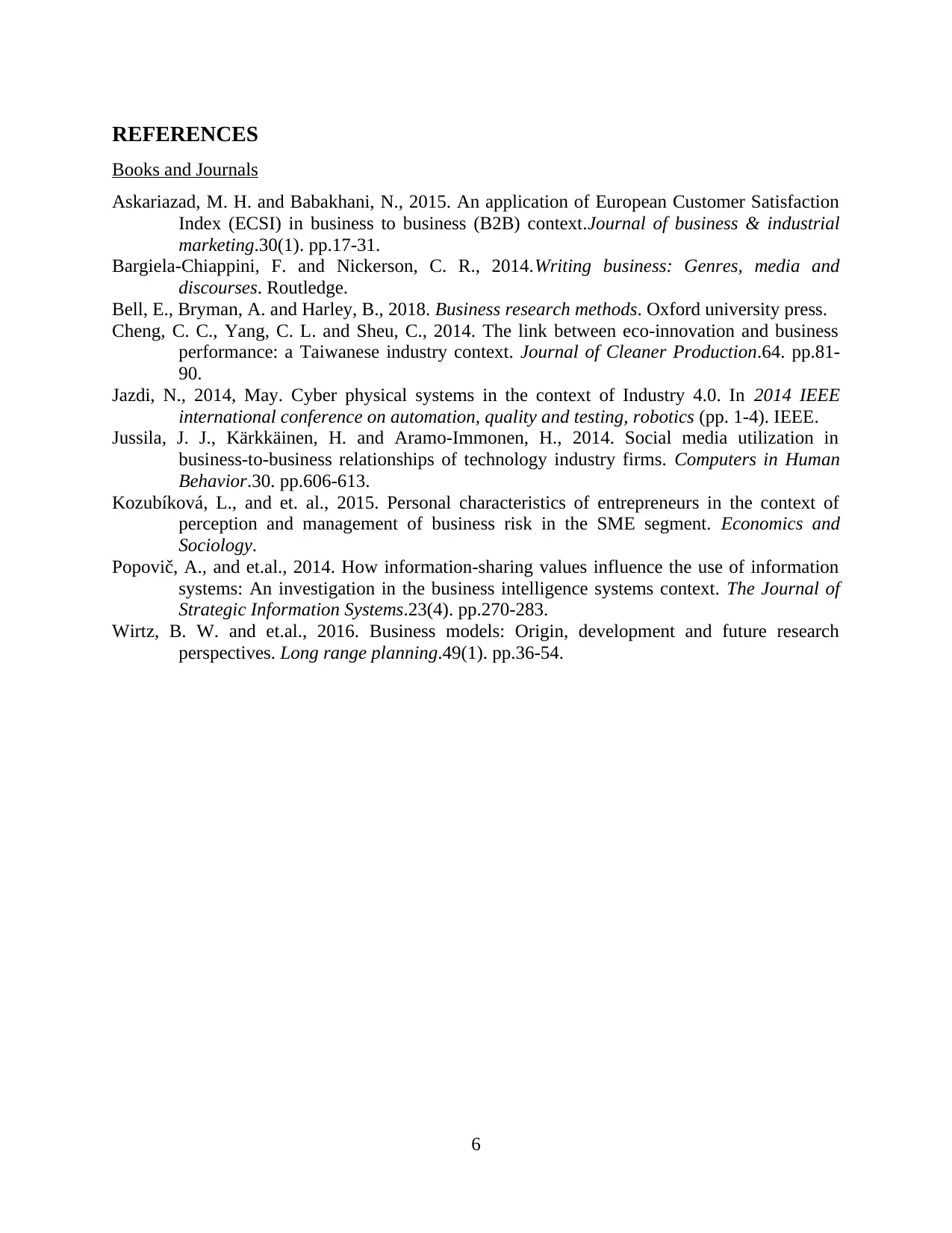
REFERENCES
Books and Journals
Askariazad, M. H. and Babakhani, N., 2015. An application of European Customer Satisfaction
Index (ECSI) in business to business (B2B) context.Journal of business & industrial
marketing.30(1). pp.17-31.
Bargiela-Chiappini, F. and Nickerson, C. R., 2014.Writing business: Genres, media and
discourses. Routledge.
Bell, E., Bryman, A. and Harley, B., 2018. Business research methods. Oxford university press.
Cheng, C. C., Yang, C. L. and Sheu, C., 2014. The link between eco-innovation and business
performance: a Taiwanese industry context. Journal of Cleaner Production.64. pp.81-
90.
Jazdi, N., 2014, May. Cyber physical systems in the context of Industry 4.0. In 2014 IEEE
international conference on automation, quality and testing, robotics (pp. 1-4). IEEE.
Jussila, J. J., Kärkkäinen, H. and Aramo-Immonen, H., 2014. Social media utilization in
business-to-business relationships of technology industry firms. Computers in Human
Behavior.30. pp.606-613.
Kozubíková, L., and et. al., 2015. Personal characteristics of entrepreneurs in the context of
perception and management of business risk in the SME segment. Economics and
Sociology.
Popovič, A., and et.al., 2014. How information-sharing values influence the use of information
systems: An investigation in the business intelligence systems context. The Journal of
Strategic Information Systems.23(4). pp.270-283.
Wirtz, B. W. and et.al., 2016. Business models: Origin, development and future research
perspectives. Long range planning.49(1). pp.36-54.
6
Books and Journals
Askariazad, M. H. and Babakhani, N., 2015. An application of European Customer Satisfaction
Index (ECSI) in business to business (B2B) context.Journal of business & industrial
marketing.30(1). pp.17-31.
Bargiela-Chiappini, F. and Nickerson, C. R., 2014.Writing business: Genres, media and
discourses. Routledge.
Bell, E., Bryman, A. and Harley, B., 2018. Business research methods. Oxford university press.
Cheng, C. C., Yang, C. L. and Sheu, C., 2014. The link between eco-innovation and business
performance: a Taiwanese industry context. Journal of Cleaner Production.64. pp.81-
90.
Jazdi, N., 2014, May. Cyber physical systems in the context of Industry 4.0. In 2014 IEEE
international conference on automation, quality and testing, robotics (pp. 1-4). IEEE.
Jussila, J. J., Kärkkäinen, H. and Aramo-Immonen, H., 2014. Social media utilization in
business-to-business relationships of technology industry firms. Computers in Human
Behavior.30. pp.606-613.
Kozubíková, L., and et. al., 2015. Personal characteristics of entrepreneurs in the context of
perception and management of business risk in the SME segment. Economics and
Sociology.
Popovič, A., and et.al., 2014. How information-sharing values influence the use of information
systems: An investigation in the business intelligence systems context. The Journal of
Strategic Information Systems.23(4). pp.270-283.
Wirtz, B. W. and et.al., 2016. Business models: Origin, development and future research
perspectives. Long range planning.49(1). pp.36-54.
6
1 out of 8
![[object Object]](/_next/static/media/star-bottom.7253800d.svg)





